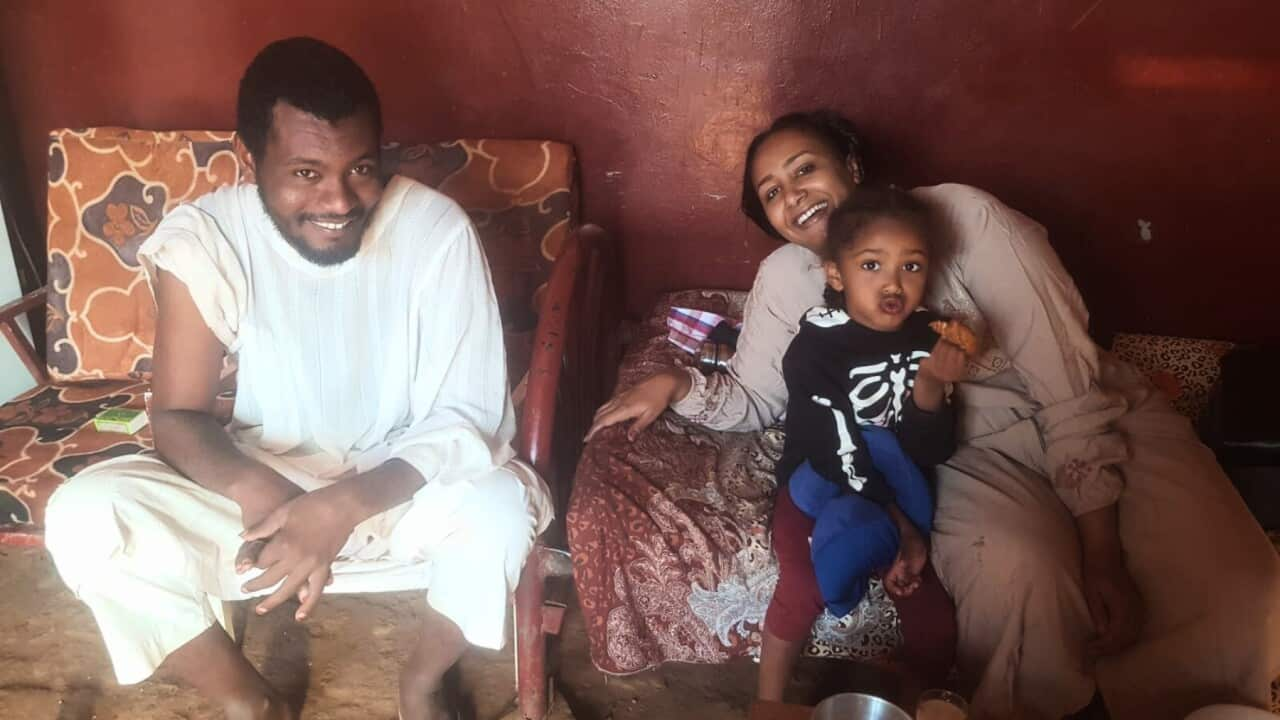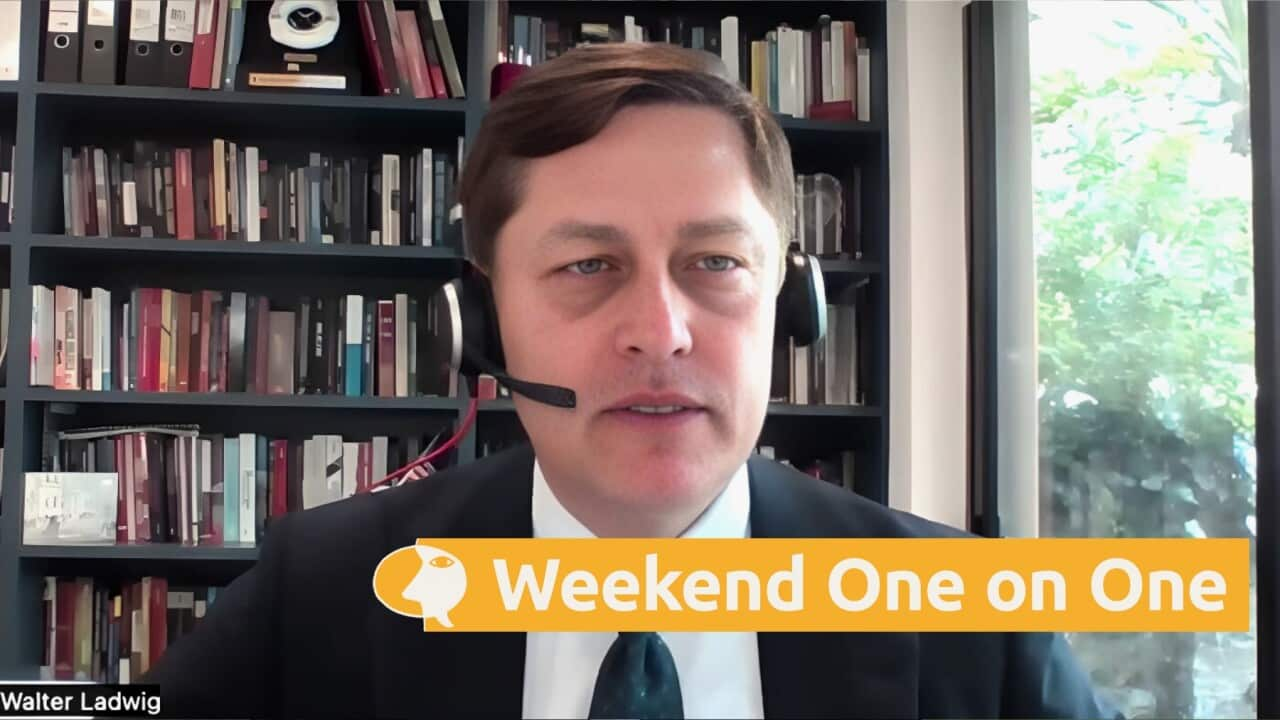TRANSCRIPT
Just a warning that the audio you're about to hear is quite disturbing and appears to depict a significant war crime.
[Sound effect – Jeering, shots]
What you're listening to comes from a video provided to SBS News by the locals of a Sudanese town laid waste to by paramilitary forces.
You can hear the sound of militants jeering as they stand over a number of men seated on the sand of the desert.
Then there are gunshots.
This is one of several pieces of footage which appears to depict a massacre in the Al Jazirah province of Sudan, just south of the capital Khartoum, which started about a week ago.
Local health authorities say the Rapid Support Forces or RSF killed at least 124 people, primarily civilians, with hundreds more wounded.
Azza Elssaid is a Sydney-based support worker who grew up in the town of Tamboul which is the epicentre of the violent rampage.
She says members of her family have been killed, wounded and displaced in the attacks and her 27-year-old brother Ibrahim is now missing.
“My brother who is lost now, Ibrahim, he kept calling me two weeks ago about he want to run away from Sudan, he want to go to Egypt, he want to start a new life. There is nothing in Sudan. He can't work, he can't study, he can't do nothing. And I refused. I refused because I want him to be with my dad. My dad is an old man and he needs him and he has diabetes. I told him, 'stay with my dad'. And now I lost my brother. Make me feeling like I'm guilty. If he die or anything happened to him, I'll feel guilty. It's very hard to think about this. I keep praying for God to save him and keep him safe for me and for my dad.”
The RSF raided the town of Tamboul and swept through the surrounding villages.
For a year and a half the RSF have been battling with the Sudanese army in a devastating war which has torn the country apart and plunged the 50 million citizens into the largest humanitarian crisis in the world.
Ms Elssaid says the assault on her people was triggered by a top RSF commander from her town named Abu Aqlah Keikel surrendering himself and his fighters this month and switching sides to the Sudanese army.
“He's joined the Sudanese army, which makes them angry and hateful. And they came to the villages and the east of Al Jazirah just to kill, and force displacement of all my people from there and kill everyone they see. And then they went to the other villages called al-Sireha and Zorga and they killed all them in there.”
The United Nations reports that close to 47,000 people have been displaced over the past week of attacks and says the RSF has shot civilians, and sexually assaulted women and girls amid the violence.
Ms Elssaid says she's also seen footage of a family member from her tribe who was raped by some of the fighters.
Dr Ahmed Maglad, spokesman for the Sudanese Australasian Medical Professionals Association, says this kind of conduct from the RSF militants is part of a pattern.
“This is a trend that happens every two to three months that we see. They get upset about something and then they take a very dramatic revenge. They hijack a small town or a village. After they arrive, they rob, they kill men. Whoever resist them, they rape women, they clean the houses of every valuable thing. The last thing they do is that they burn, they burn villages, they burn crops. They make sure they don't leave anything of value back to anyone behind them and then they leave.”
Azza Elssaid says, in Tamboul, her farmer cousin who went by the nickname Wad Alshareef was killed while trying to protect his sheep.
“And I hear about one of my cousin, after he took his family out to the closest villages, he remembered that he has sheep there. He went there, they asked him, he told them why he came back and they killed him. They shot him with his animals.”
The UN's Humanitarian Coordinator in Sudan condemned the crimes and said it resembles the mass killings and sexual violence committed during the Darfur genocide in the early 2000s.
The RSF themselves were born out of Arab militias used by Sudan's former dictator Omar al-Bashir to wreak havoc on the Darfur people.
“Back then we didn't have much social media, we didn't have much on ground reporting, but we got the same outcome with burnt villages, the killing of 300,000 in Darfur. Al Bashir himself, the leader of the previous fallen regime, he used the RSF fighters to do this dirty job.”
The Armed Conflict Location and Event Data group, which has monitored the Sudan war, estimates more than 24,000 people have been killed over the year and a half.
Ted Chaiban, UNICEF Deputy Executive Director, says more attention needs to be paid to the crisis which has seen 11 million people internally displaced and roughly half the 50 million population suffering from a lack of food.
“This is one of the most acute crises there we're facing globally, and yet it is a forgotten crisis. It is the largest displacement crisis in the world, we have levels of food insecurity that we have almost never seen, certainly not in a generation. Sudan needs the same level of attention as Gaza and Lebanon.”
Dr Maglad, who's based in Melbourne, was in Sudan's capital Khartoum at the beginning of the war, helping the sick and wounded.
He says one of the challenges of providing medical aid to the needy is that doctors themselves are often targeted and abducted like his cousin Khalid Saleh.
“RSF fighters, they actually target doctors. If you are a doctor, you are automatically detained. I have my cousin, he's been detained since April last year. Until now, we don't know where his whereabouts. They take you with them so you work as a private doctor for the injured ones.”
He says he still struggles with a feeling of guilt after making the difficult decision to leave Sudan with his family.
“Luckily I managed to get a bus and take my family and escape the back way all the way to Egypt. I still remember the moment I left the hospital with so many on the beds and on the floor on the corridors and they looking at me, they knew that I'm leaving and there's no other doctor coming and it was just a total disappointment in their faces. I could see that. But at the same time I had my family. We couldn't ensure the safety of our home, we couldn't provide enough food so we had to leave.”
And Azza Elssaid, whose brother remains missing and the rest of her family displaced to the nearby town of Halfa, says she too grapples with a significant emotional burden.
Her 80-year-old diabetic father has also been displaced multiple times over the last week, forced to walk for upwards of 12 hours each time to find safety.
She says it's incredibly difficult to hear of her family's suffering over WhatsApp voice messages while feeling powerless to help them.
“When I hear these stories it makes me just wanna go. I just wanna go. When I see my kids happy, eating, safe, secure, it makes me happy, but makes me guilty at the same time because my family, the man who brought me to this world, now he's suffering. He's hungry.”













